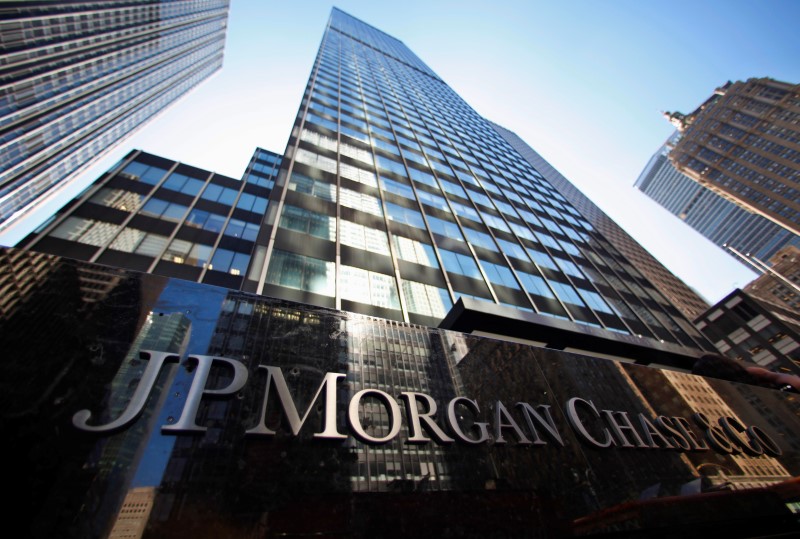By David Henry and Dan Freed
NEW YORK (Reuters) - JPMorgan Chase & Co (N:JPM) signalled a rough first quarter on Tuesday with double-digit declines in investment banking revenues and a $500 million increase in provisions for expected losses on energy loans.
Plummeting oil prices, volatile markets, stubbornly low interest rates, pressure from regulators and a slowdown in China have combined to hurt banks worldwide over the past few months.
Against such a backdrop, companies are either shying away from or unable to issue debt and equity and investors are reluctant to take on more risk, said Daniel Pinto, JPMorgan's head of investment banking.
"There is no doubt that so far it has been a very tough quarter," Pinto said during a presentation at the bank's investor day in New York.
JPMorgan's investment banking fee revenues were down 25 percent so far this quarter compared with a year ago and its trading revenues were 20 percent lower, although Pinto said some of the decline in trading was due to a strong year-ago performance when JPMorgan profited from Switzerland's decision to remove its currency cap.
The biggest U.S. bank by assets also gave itself another year to meet one of its most important profit goals, as hopes for higher interest rates fade, hampering the bank's ability to make profits on its loans.
JPMorgan's shares closed down 4.18 percent, helping to drag down the S&P financials index (SPSY) 1.8 percent.
IT'S ONLY JUST BEGUN
Thousands of jobs have been cut in the U.S. energy industry alone and roughly a third of oil producers, or 175 companies, are at high risk of slipping into bankruptcy this year, according to a study by Deloitte, increasing the risk that bank loans will not be repaid.
JPMorgan's move to raise its energy loan loss reserves by over 60 percent comes a month after the bank said oil companies were "surprisingly resilient," but a drop in the price of oil (CLc1) (LCOc1) below $30 a barrel in January has made the situation worse.
Around half of the increase in reserves for oil and gas loans was concentrated on a couple of corporate clients, the bank said.
"There will be a meaningful number of these players who have no options. I think we have only begun to see the range of bankruptcies in oil and gas,” said Doug Petno, the head of JP Morgan's commercial bank.
Under a "relatively severe" scenario, with oil prices at $25 a barrel for 18 months, the bank said it would have to set aside an additional $1.5 billion in reserves.
JPMorgan's oil and gas loan portfolio amounted to $42 billion, or less than 2 percent of total assets, as of the end of September, according to the bank's latest available data.
The global rout in commodities is beating up banks worldwide. Standard Chartered Plc (L:STAN), which is heavily exposed to energy and mining, reported its first annual loss since 1989 on Tuesday after bad loans soared.
JPMorgan's U.S. rivals stockpiled their defenses against energy losses last month with Wells Fargo & Co (N:WFC) raising provisions against soured assets by more than 70 percent, nearly half of them for oil and gas loans. [L8N14Z40K]
JPMorgan also expects to increase reserves for metals and mining loan exposure by $100 million to $350 million.
The bank said it had not seen any significant contagion from the troubles in the energy sector into its other lending businesses such as commercial real estate and business banking.
RATES DISAPPOINTMENT
Lake said JPMorgan was now targeting 2018 rather than 2017 to meet its profitability target of a 15-percent return on tangible common equity as hopes fade that the U.S. Federal Reserve will follow up its quarter-percentage-point December rate hike with more increases this year.
JPMorgan achieved a 13-percent return on tangible common equity last year. Lake declined to say when she expected the Fed to resume its rate increases.
Despite market volatility and rising provisions, JPMorgan did not ramp up its cost-cutting targets as it has in previous years. The bank is only halfway through a previously announced $4.8 billion cost-cutting plan, and further belt tightening could hurt its businesses, according to analysts.
Rivals such as Morgan Stanley (N:MS), Goldman Sachs Group Inc (N:GS), Bank of America Corp (N:BAC) and U.S. Bancorp (N:USB) have all recently talked about further cost-cutting efforts.

The bank also predicted "massive uncertainty" if Britain, the home of JP Morgan's European headquarters, votes to exit the European Union in a referendum on June 23.